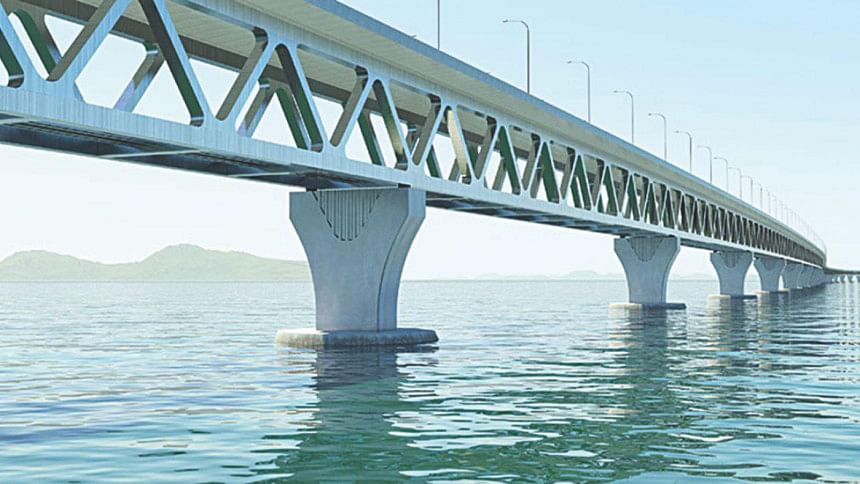Maximum accountability should be the norm

A Canadian court verdict related to the Padma Bridge (PB) consultancy contact has set off widespread proclamation of vindication of the concerned Government of Bangladesh (GOB) superiors, allegations by the Bangladesh ruling regime of a conspiracy by the World Bank (WB) and Dr. Muhammad Yunus, and even demands for lawsuits against the WB for defamation. This commentary explores if such sweeping reactions are justifiable.
Unquestionably the Canadian verdict can be seen as the glass half full from a Bangladesh perspective. It is from a reputable foreign court and does not corroborate the WB'S allegations. Bangladesh has finally found a window of momentary relief from the disease (corruption) that continues to tarnish the international recognition of its stellar economic and social achievements. The sweeping sentiment of the moment is that Bangladesh is not as corrupt as others think!
For its part, the WB has some pressing issues on hand in this regard. Against the merit of not revealing the identity of whistleblowers (whose emails dating back to 2010 ignited the PB saga), the WB needs to reckon with the negative image of an interventionist organisation using only unproven allegations to demand specific governance actions by a sovereign country and then withdraw its support altogether for development projects. While the WB is demanding transparency from sovereign governments, its own actions are contrary to that. While no large organisation is ever beyond governance problems or questions, the WB has not yet done a convincing job of dispelling the globally popular perception of bending rules in favour of selected countries and business interests.
For maximum accountability and transparency, the operating norm should be "guilty until proven innocent" and the burden is to prove innocence. Accordingly the boisterous GOB reactions appear premature.
Having said that, it is not acceptable for the government of any people's republic, to seek refuge in the axiom of "innocent until proven guilty". For maximum accountability and transparency, the operating norm should be "guilty until proven innocent" and the burden is to prove innocence. Accordingly the boisterous GOB reactions appear premature.
First, the Canadian acquittal does not involve any GOB official. [Charges against a Bangladeshi minister were suspended on the grounds of no Canadian jurisdiction and extradition treaty]. While the acquittal does not establish any wrong doing by the officials of SNCL (or GOB), it does not prove its absence either. The acquittal resulted from the judge dismissing the wiretap evidence because he questioned the reliability of the information cited to obtain prior court permissions for wiretapping.
Second, unqualified celebration of the Canadian acquittal provides indirect support for SNCL, a multinational that has faced numerous allegation of corruption. SNCL settled fraud allegations with some Canadian cities and its executives are currently the subject of Libya and McGill University Health Centre corruption cases.
Reportedly SNCL routinely used a budgeting item, Project Consultancy/Commercial Costs (PCC), for bribery payments [http://www.cbc.ca/news/canada/snc-lavalin-international-used-secret-code-for-bribery-payments-1.1386670]. Incidentally, a now acquitted SNCL official's (Mr. Ramesh Shah) notes on a May 2011 trip to Bangladesh, while bidding for the PB consultancy contract, had pencilled in percentage bribery allocations under PCC for senior officials who later became the target of the WB's governance demands. [http://icclr.law.ubc.ca/sites/icclr.law.ubc.ca/files/publications/pdfs/Chapter%201%20.pdf]. Allegedly, SNCL at the time, ranked second to Halcrow Group Ltd, a British firm, on the recommendation list of the Bangladesh Bridge Project Evaluation Committee [http://www.theglobeandmail.com/report-on-business/international-business/asian-pacific-business/snc-lavalin-in-bangladesh-world-bank-sees-conspiracy/article8963225/]. Two weeks later (June 2011), SNCL instead was recommended for the PB consultancy contract by the GOB to the WB.
Such information, albeit not yet adjudicated, warrants a more guarded reaction. The WB may have shared such specifics with the GOB (and Canadian police) leaving it to the country authorities for possible public disclosure. Unfortunately, neither the GOB nor the Anti Corruption Commission disclosed the WB memos despite the merits [http://www.thedailystar.net/news-detail-251360].
Third, along with the PB case, the WB found evidence of corruption by SNCL in an electricity infrastructure project in Cambodia. In April 2013, SNCL agreed to a 10 year ban on bidding in the WB related projects. Notably, in 2011, the WB suspended new lending to Cambodia over the eviction of poor landowners in Phnom Penh, when urged by the NGOs. [https://www.theguardian.com/global-development/2011/aug/10/world-bank-suspends-cambodia-lending]. Previously, in 2009, the WB suspended funding for two of its 25 Kenyan projects, pending investigation of corruption and fraud. [http://reliefweb.int/report/kenya/world-bank-suspends-funds-over-corruption-kenya]. Interestingly, Kenya's Internal Audit Department exposed the two cases. It seems that Bangladesh was likely not singled out by the WB on corruption allegations as suggested by a conspiracy theory (involving Dr. Yunus).
Fourth, the GOB repeatedly argued that there was no corruption since no money actually changed hands. But the WB, Canada and most of the developed countries treat any plan/scheme of corruption as a crime as well. Clearly, prevention is better than cure and Bangladesh is better off adopting this wider definition in its fight against corruption.
To conclude, the Canadian acquittal of the executives of a corrupt Canadian multinational by itself is very thin ice for Bangladesh to march on while trying to become an upper middle income country of clean governance. The WB and any external party would naturally act to promote their interests. It is up to Bangladesh to act, preserve and promote its own by seeking mutual interests, discreetly working out the frictions, and deepening development partnerships, not hostilities.
The writer is Professor, McGill University, Montreal, Canada.
Email: [email protected], [email protected].

 For all latest news, follow The Daily Star's Google News channel.
For all latest news, follow The Daily Star's Google News channel. 



Comments